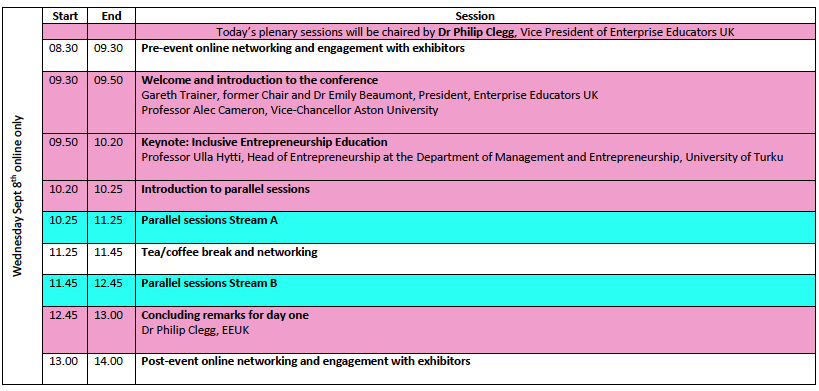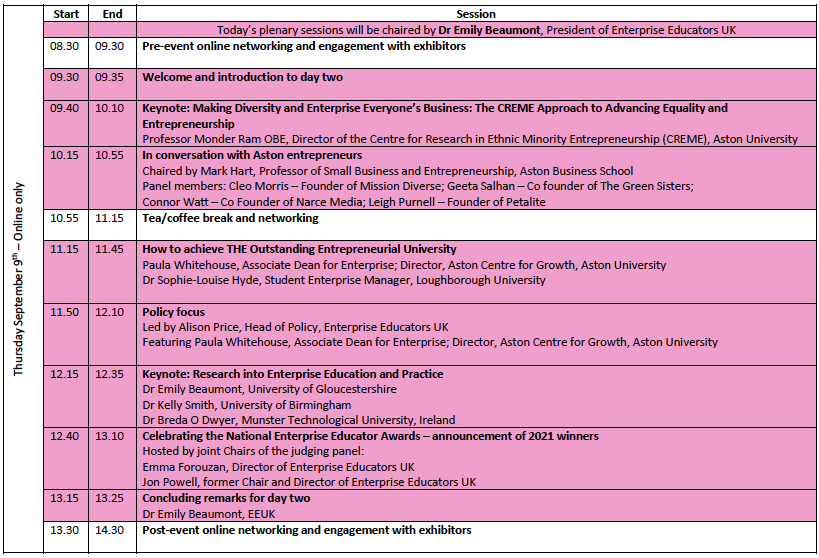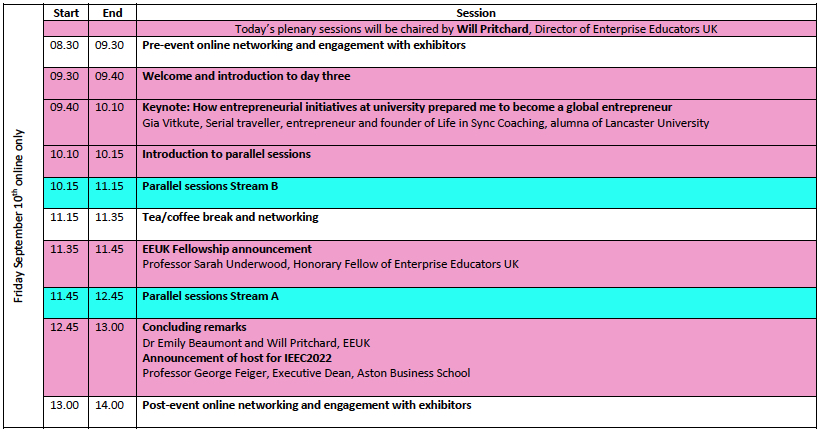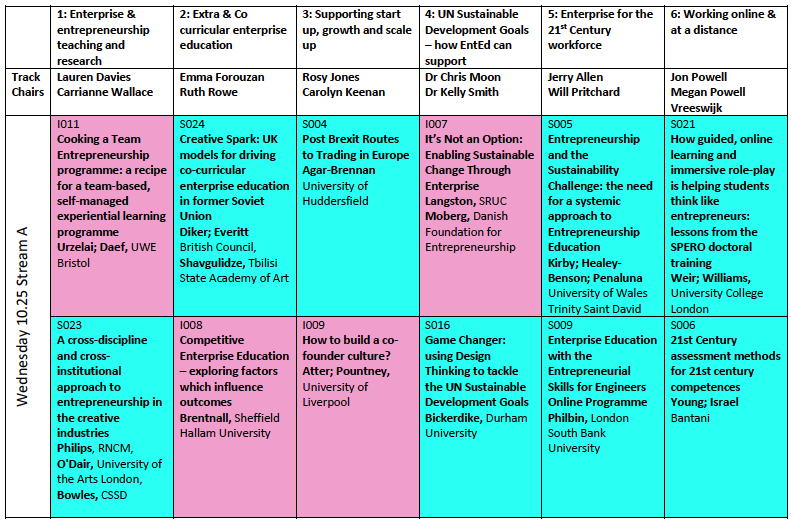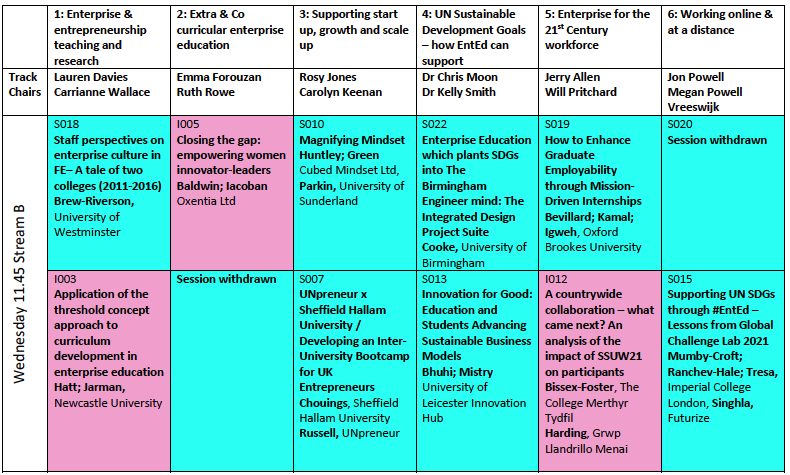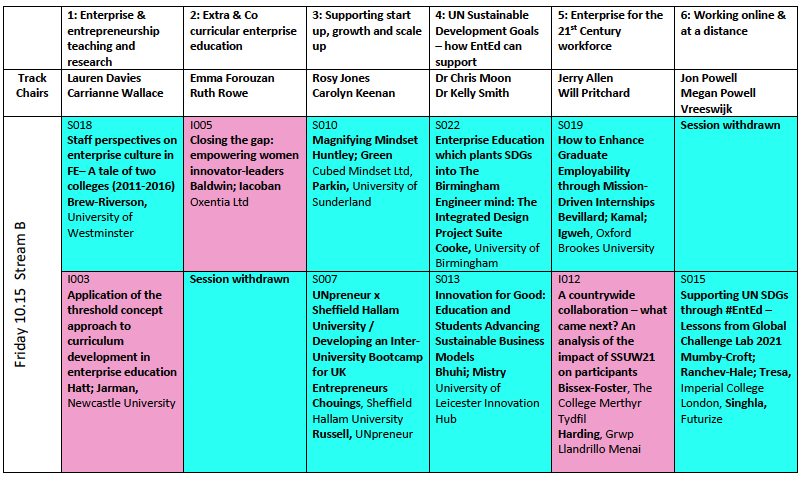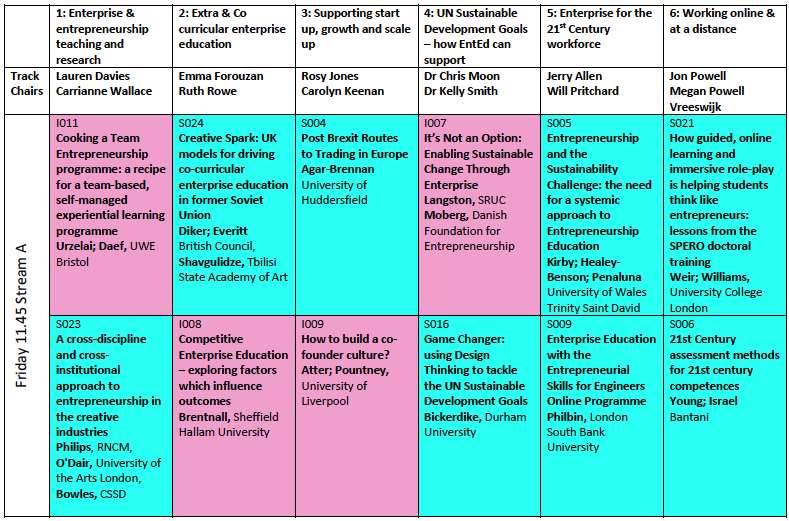IEEC2021 Programme DRAFT and subject to change
Click on the tables below to enlarge.
To download a PDF Version please click here.
WEDNESDAY SEPTEMBER 8th – ONLINE ONLY
THURSDAY SEPTEMBER 9 TH – ONLINE ONLY
(Scroll down to find the parallel session table and summaries also)
IEEC2021 Parallel Sessions DRAFT and subject to change
To download a PDF Version please click here.
WEDNESDAY SEPTEMBER 8TH STREAM A
WEDNESDAY SEPTEMBER 8TH STREAM B
FRIDAY SEPTEMBER 10TH STREAM B
FRIDAY SEPTEMBER 10TH STREAM A
IEEC2021 SESSION SUMMARIES
Stream A – Wednesday 8th and Friday 10th September
I011 Cooking a Team Entrepreneurship programme: a recipe for a team-based, self-managed experiential learning programme
Dr Berrbizne Urzelai; Steve Daef, UWE, Bristol
UWE was a pioneer in the UK launching a Team Entrepreneurship degree in 2013. Since then, the programme has been adapting considering the feedback from educators, partners and students. This session will show how the programme has evolved towards a competency-based framework. The new design remains true to its radical origins but builds on frameworks that did not exist when it was launched. We will make use of interviews with educators to reflect on its evolution, design and performance.
S024 Creative Spark: UK models for driving co-curricular enterprise education in former Soviet Union (Central Asia, South Caucuses and Ukraine)
Hande Diker; Richard Everitt, British Council; Dr Tamara Tamta Shavgulidze, Tbilisi State Academy of Art
To share innovative approaches of co-curricular enterprise skills development: drawing on examples from university partnerships in the Creative Spark programme (launched at EEUK2018) i) Overview of the Creative Spark model and achievements through international collaboration between 50 UK Universities with 7 countries (Ukraine, Kazakhstan, Kyrgyzstan, Uzbekistan, Azerbaijan, Armenia, Georgia) in former Soviet Union. Ii) Highlight how the Enterprise Education Alliance was established in Georgia, based on the EEUK and an institutional partnership examples of the HE institutions involved in Georgia Creative Spark
S004 Post Brexit Routes to Trading in Europe
Sarah Agar-Brennan, University of Huddersfield
Working with new businesses at the University of Huddersfield, I accessed the Richard Beresford Bursary to complete Brexit training. Moving from one trade agreement across Europe, to 60+, has added many levels of complexity to regulations, processes and procedures when importing and exporting into the EU. This session will present an overview of my learning, together with possible routes through and around the issues facing SME’s. I will be joined for Q&A by a representative of the Institute of Export.
I007 It’s Not an Option: Enabling Sustainable Change Through Enterprise
Dr Carol Langston, SRUC; Dr Kåre Moberg, Danish Foundation for Entrepreneurship
The scale of our global SDGs requires a regular flow of innovative ideas and solutions to create positive impact for current and future generations. Enterprise educators have long sought to develop their learners enterprising ways of thinking, acting and being. Increasingly there is an urgent imperative to build sustainability into this work. This fun and interactive workshop will explore what this means for educators and their learners and consider the key competences we can reasonably impact as we design learning experiences.
S005 Entrepreneurship and the Sustainability Challenge: the need for a systemic approach to Entrepreneurship Education
Professor David A Kirby; Felicity Healey-Benson; Kathryn Penaluna, University of Wales Trinity Saint David
While entrepreneurship is believed to have the potential to address the sustainability challenge, to date it has had relatively little impact. The session analyses the problem and introduces a new, holistic approach (Harmonious Entrepreneurship) based on systems thinking and the Harmony Principles of HRH The Prince of Wales, before considering how the pedagogy of entrepreneurship education needs to change to address the problem and create new ventures that address the triple bottom Line of Profit-Planet-People.
S021 How guided, online learning and immersive role-play is helping students think like entrepreneurs: lessons from the SPERO doctoral training programme at UCL
Dr Ruth Weir; Dr Hannah Williams, University College London
We share our learnings from our attempt to take SPERO 1, an introductory entrepreneurial training course for UCL doctoral students, from synchronous to asynchronous delivery. We’ll reveal how we tailored our content to the current career expectations of doctoral students, to create an immersive role-playing journey. We’ll share the iterative process we went through, the focus group feedback we received, and how we ended up with our current guided, online delivery model.
S023 A cross-discipline and cross-institutional approach to entrepreneurship in the creative industries
Dr Michelle Phillips, Royal Northern College of Music; Marcus O’Dair, University of the Arts London; Jessica Bowles, Royal Central School of Speech and Drama
At this midway point in The StART Entrepreneurship Project, which aims to develop and test good practice for delivering an entrepreneurial scheme relevant to the UK creative industries, we discuss: 1) key learning points so far 2) to what extent are these aspects of training particular to creative industries students? 3) to what extent do these apply across our arts disciplines? 4) how should traditional approaches to training for creative industries students be adapted for the post-COVID sector?
I008 Competitive Enterprise Education – exploring factors which influence outcomes
Catherine Brentnall, Sheffield Hallam University
Competitions and competitive pedagogies are a familiar and taken for granted activity in Enterprise Education (EE), reproduced inside and outside the curriculum. This session introduces the concept of Competitive Enterprise Education (CEE) and explores factors which can influence outcomes in such activities. Delegates will develop a realistic view of CEE interventions, and the spectrum of positive and negative outcomes which are possible. A better understanding of these factors may inform the deployment, refinement and (re)evaluation of such activities.
I009 How to build a co-founder culture? – NO SLIDES USED.
Dr Andrew Atter; Alison Pountney, University of Liverpool
This fun interactive session uses the “wisdom of crowds” in a card sort exercise, with participants tasked to distinguish the common vs unique attributes of a co-founder vs solo-preneur culture. Are they different? Does one evolve into the other? Participants will sort EntreComp word cards using a Miro board. In an ideal world, this should form a logical pyramid. But this could turn out very differently! The exercise will help us directly in planning our LCR Founders Project.
S016 Game Changer: using Design Thinking to tackle the UN Sustainable Development Goals
Rachel Bickerdike, Durham University
Durham University will introduce the award-winning “Game Changer”; an innovation programme that uses a Design Thinking approach to tackle the UN Sustainable Development Goals. Game Changer has recently been recognised by the UN as a “best practice” activity to help implement the goals. The session will reflect on how they have engaged over 500 students with the SDGs, and their methods of delivery including a 6-week workshop programme, a 2-day sprint and a 5-day online challenge and present a toolkit for colleagues to use.
S009 Enterprise Education with the Entrepreneurial Skills for Engineers Online Programme
Professor Simon Philbin, London South Bank University
This seminar will provide insights and lessons learnt from the online course called ‘Entrepreneurial Skills for Engineers’, which was developed by London South Bank University (LSBU) in partnership with the Institution for Engineering and Technology (IET). The online programme adopts a broad view on entrepreneurial skills and includes understanding how to develop innovative ideas through to new products and businesses as part of new venture creation as well as developing a new business area within an existing organisation.
S006 21st Century assessment methods for 21st century competences
Dr Stacey Young; Hazel Israel, Bantani Education
Israel and Young of Bantani Education will examine some of the current thinking and practice in the assessment of entrepreneurial competences (with a focus on EntreComp), with an emphasis on those that promote assessment as learning (rather than assessment of learning). Young and Israel argue that entrepreneurial learners must be equipped to use multimodal evidence to claim and demonstrate for themselves competence and impact, which goes beyond formal assessment methods to produce the relevant evidence of competence mastery.
Stream B – Wednesday 8th and Friday 10th September
S018 Staff perspectives on enterprise culture in FE– A tale of two colleges (2011-2016)
Dr Irene Brew-Riverson, University of Westminster
This session will be about sharing the results of my EdD Thesis that considers how staff in two FE colleges define enterprise culture, how enterprise culture manifests itself and its consequences. I developed a simple model that can support institutions in both the private and public sector who wish to develop a framework for engaging in enterprise-related projects. Colleagues in attendance will be able to consider how the model might add value to their discourses about enterprise and entrepreneurship education.
I005 Closing the gap: empowering women innovator-leaders
Holly Ann Baldwin; Andrea Iacoban, Oxentia Ltd
Research both in the UK and globally has shown that women are underrepresented as both leaders and entrepreneurs in many sectors. This interactive session explores how we can close this gap through discussion of a virtual course supporting female innovators in HealthTech. It looks at ways of integrating course design, pedagogy, and technology to help empower women leaders in innovation.
S010 Magnifying Mindset
Angela Huntley; Stephen Green, CUBED Mindset Limited; Venetia Parkin, University of Sunderland
The session will outline a proven programme and approach designed to develop emotional intelligence, softs skills and an entrepreneurial mindset, and stimulate life-long personal growth as a foundation for success in business. Equally relevant to graduate start-ups, freelancers or intrapreneurs, and students from a diverse range of backgrounds, the approach combines psychology, business tools and innovation techniques to help participants overcome potential barriers to success including confidence issues and resilience, self-awareness and social awareness, goal setting and accountability.
S022 Enterprise Education which plants SDGs into The Birmingham Engineer mind: The Integrated Design Project Suite
Dr Neil Cooke, University of Birmingham
The University of Birmingham School of Engineering Integrated Design Project (IDP) modules have run since 2017 and are taken by 1000-1500 students every year. They embed the United Nations Sustainable Development Goals (SDGs) in multiple ways. This increases the likelihood that sustainability considerations and agency to effect real-world change become part of the student’s emergent professional identity as an engineer. In this session we present best-practice module design considerations/challenges and some notable learning unit implementations.
S019 How to Enhance Graduate Employability through Mission-Driven Internships
Clelia Bevillard; Dr Samia Kamal; Lydiah Igweh, Oxford Brookes University
Running an effective SME micro-internships initiative generates multiple benefits for universities, SMEs and the students and recent graduates involved. It provides a platform to address current pressing issues including graduate employability and student experience, fast-growing business sectors, agile working, and diversity and inclusivity. This seminar will provide a detailed toolkit and case studies to deliver this initiative successfully and how to capture the impact created.
S020 Learning from Each Other Through Design Thinking – WITHDRAWN
Dr Bo Kelestyn; Luke Netherclift; Johannes Pittgens; Celine Nithila-George, University of Warwick
In this interactive session we will reflect on the impact of design thinking on co-creation at the University of Warwick. This way of thinking and co-creating innovation is new to HE as it brings staff and students together to tackle challenges in disruptive and imaginative ways, whilst teaching students enterprise skills. We will share four years of experience in engaging the student body in an authentic dialogue and collaborating with the wider University enterprise ecosystem during the pandemic.
I003 Application of the threshold concept approach to curriculum development in enterprise education
Dr Lucy Hatt, Newcastle University; Dave Jarman, University of Bristol
The threshold concept approach offers many benefits to educators including a means to avoid an overstuffed curriculum. In this session, we will show how the threshold concepts we have identified in entrepreneurial thinking (EERPF Funded Project) have been used to develop a curriculum for a post-graduate module in innovation and change. Participants will be given the opportunity to reflect on how this approach might be used to develop their own curricula, and to share ideas on ways to engender threshold concept understanding in learners.
S017 Championing Women’s Entrepreneurship through extra-curricular enterprise provision – reflections of ‘She’s the Business’ – WITHDRAWN
Jonathan Styles, University of Manchester
‘She’s the Business’ is an annual event delivered as part of the Masood Entrepreneurship Centre’s extra-curricular enterprise activities – developed to support enterprising women at both The University of Manchester and across the North West Region. The session will provide a range of reflections (both positive and negative) of the event’s impact on supporting and fostering women’s entrepreneurship as well as providing educators with a range of insights on best practices in the development and provision of extra-curricular activities.
S007 UNpreneur x Sheffield Hallam University / Developing an Inter-University Bootcamp for UK Entrepreneurs
Darren Chouings, Sheffield Hallam University; Kallum Russell, UNpreneur
At Sheffield Hallam University, we have been providing tailored support to entrepreneurs and start-ups with the ambition and potential to scale up their business. In this session, Darren and Kallum will share their experience in developing the new UK pilot Inter-University bootcamp between Sheffield Hallam University and “UNpreneur”, and their approach to creating a programme that was initially delivered virtually, but has the ambition to grow into an in person live event focussing on UK wide Student and Graduate start-ups.
S013 Innovation for Good: Education and Students Advancing Sustainable Business Models
Rajinder Bhuhi; Asha Mistry, University of Leicester Innovation Hub
Learn how to maximise the power of students to drive and deliver impactful sustainability support to local businesses. Gain deeper insight into how the UN SDGs Framework has been used to generate value through making process improvements in business and being innovative in the development of business models. Plus, how students have been upskilled in sustainability and commercial awareness by taking part in the award-winning interactive training and work experience within the Sustainability Audit programme to become Social Impact Ambassadors.
I012 A countrywide collaboration – what came next? An analysis of the impact of SSUW21 on participants
Christine Bissex-Foster, The College Merthyr Tydfil; Stephanie Harding, Grwp Llandrillo Menai
Our session will look at Summer Start Up Week 21 (SSUW21) and how we analysed feedback from the participants on how the week’s events affected them. This data will be collected immediately after the Festival and two months on to show longer-term as well as instant impact.
S015 Supporting UN SDGs through #EntEd – Lessons from Global Challenge Lab 2021
Ben Mumby-Croft; Sarah Ranchev-Hale; Rea Tresa, Imperial College London; Rhea Singhla, Futurize
The Global Challenge Lab 2021 is a brand-new virtual entrepreneurship programme run by the Imperial Enterprise Lab in partnership with Tsinghua University’s x-lab in Beijing and 9 further partner universities across the world. Its mission is to bring together over 300 hundred students and alumni to grow their international network, gain enterprising skills, and create new ideas that help achieve UN SDG 3: Good Health and Wellbeing. This session will reflect on the #EntEd lessons learned and recommendations for similar large-scale, virtual programmes in the future.
